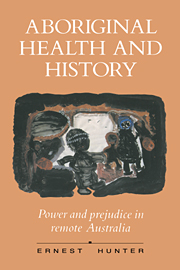Summary
INTRODUCTION
Reading Battye's 1915 history of the north-west, one is seduced by the illusion of progress in the early development of the region. The time of writing was a period of high feelings for king and country. Given his imperialist sentiments, his preoccupation with territorial expansion and economic development is not surprising. Here was the fringe of the empire, the expansion of which both testified to and justified the rule of order and reason. However, for Aborigines of the Kimberley, order and reason in the early experiences of contact with Europeans was probably as illusory as the imperial policies formulated on their behalf, which provided that they be brought the benefits of Christianity and civilisation, be accorded full status as British subjects, and have their physical well-being fully protected (Long 1979). The stories of Aborigines in the Kimberley must be stripped of this veneer of progress and promises.
Documented history constitutes only a fraction of the millennia of Aboriginal occupation of the region. Groups continued to make first contact with European culture, thus entering ‘history’, well into this century. The consequences for those Aborigines emerging from the Western Desert to the mission at La Grange in the 1960s and 1970s bore scant resemblance to the experiences of Aborigines adapting to the arrival of settlers a century earlier. Aboriginal experiences of Europeans in the Kimberley must thus be seen in both diachronic and synchronic perspective.
- Type
- Chapter
- Information
- Aboriginal Health and HistoryPower and Prejudice in Remote Australia, pp. 24 - 51Publisher: Cambridge University PressPrint publication year: 1993



